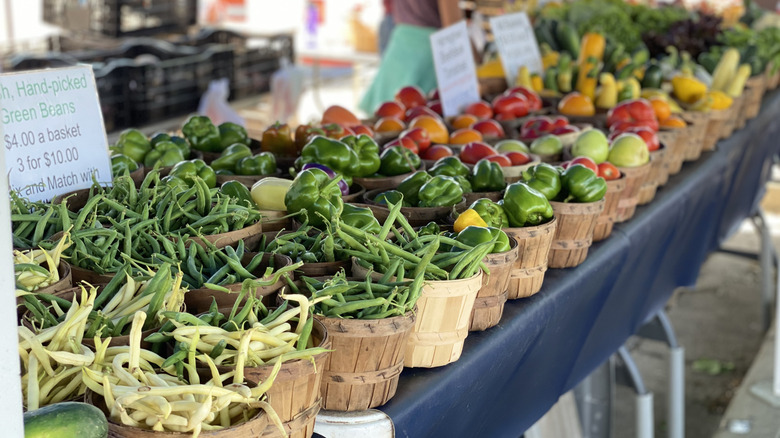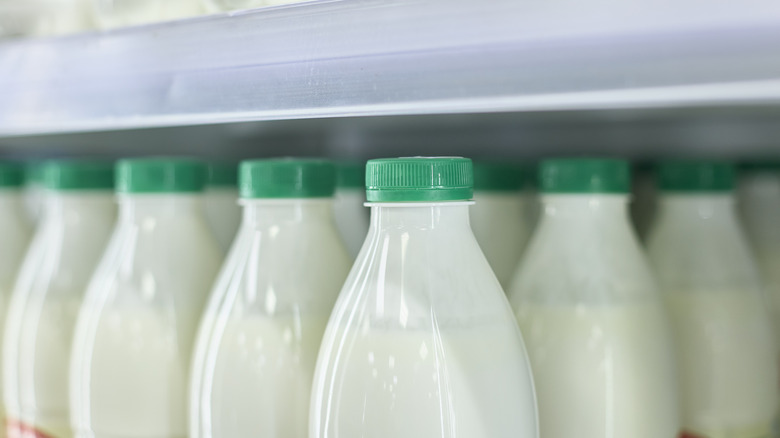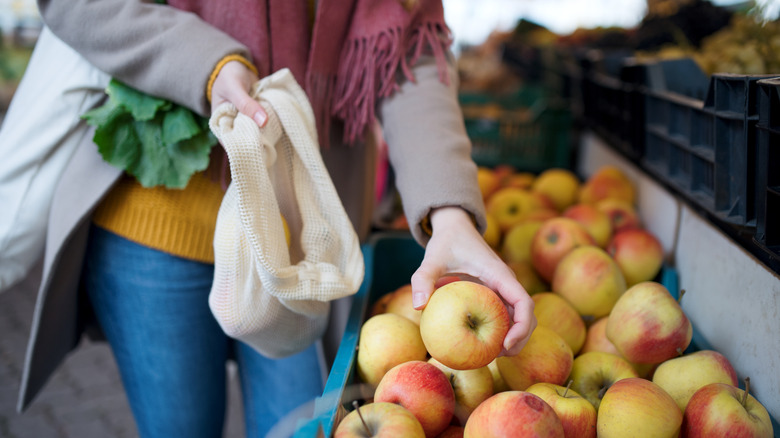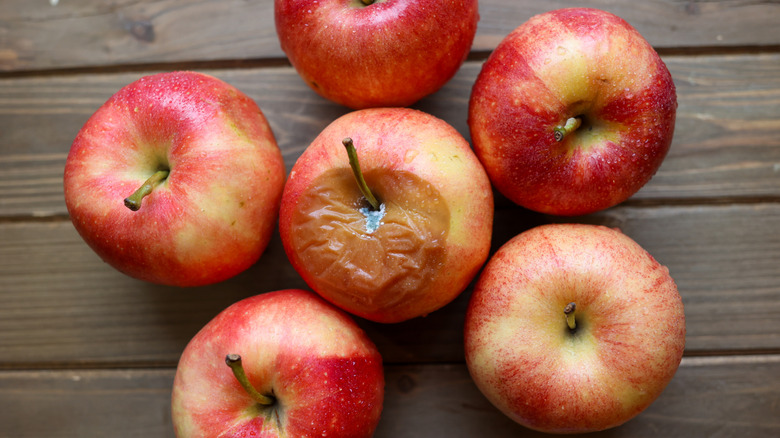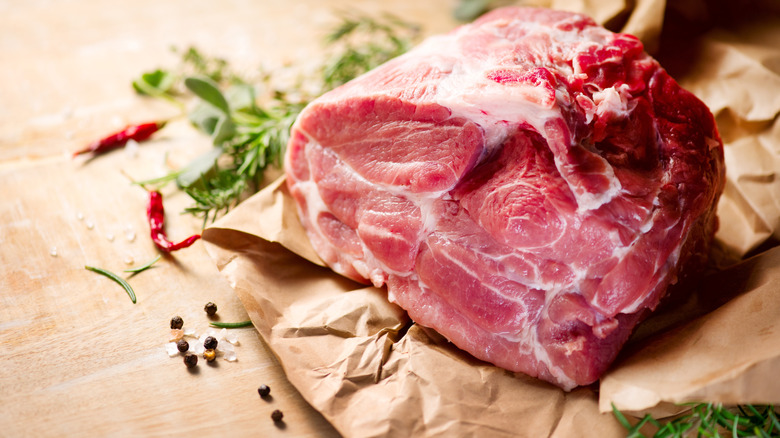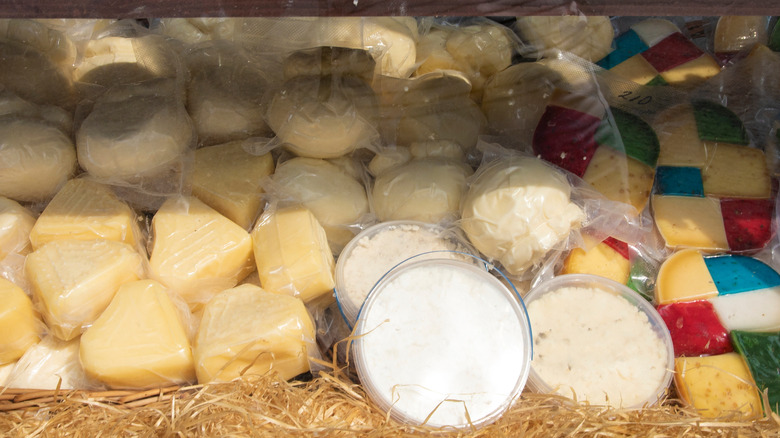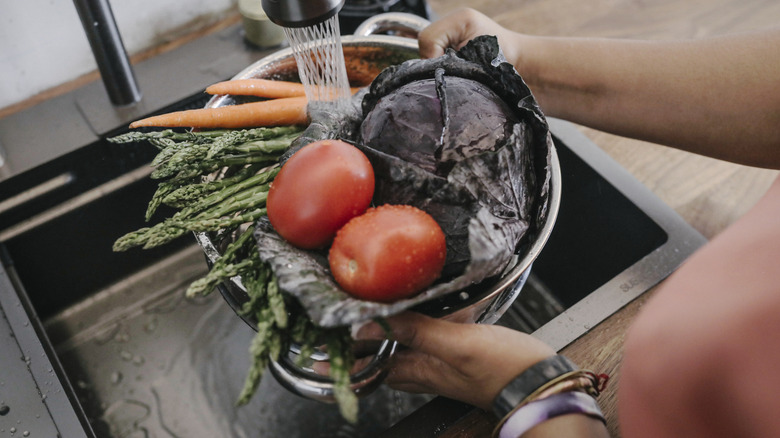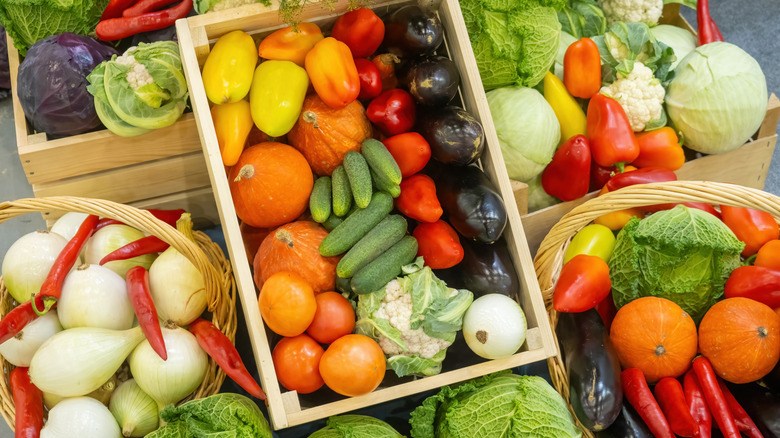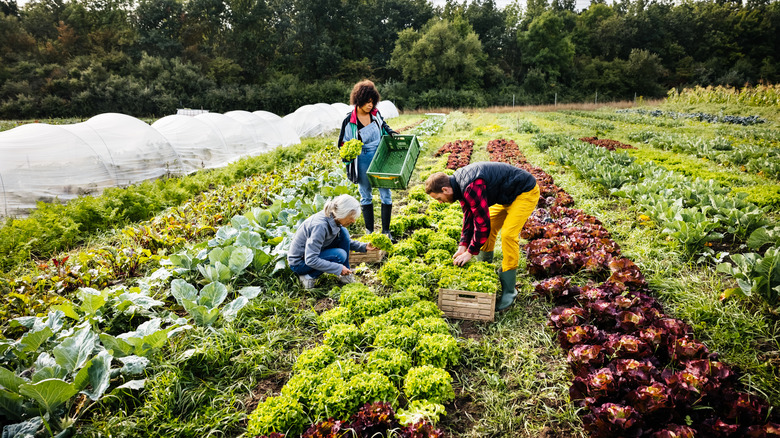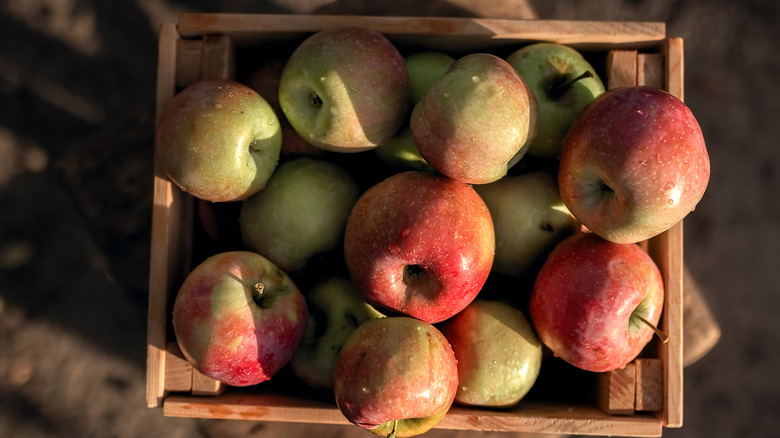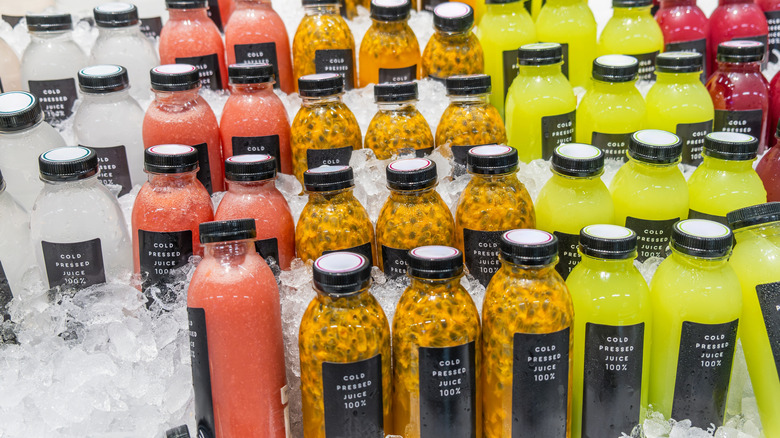12 Things To Watch Out For When Buying Food At A Farmers Market
Shopping at a farmers market can be the perfect way to spend a summer or fall day, offering a feast for all of the senses. You can pick up the freshest local produce while sipping a handcrafted latte under a sunny sky, and feel good knowing that you're supporting local businesses and farmers. Beneath the charm of the wildflower bouquets and heirloom tomatoes, however, lie a few pitfalls that may slow down even the most seasoned shoppers. Knowing what to watch out for during your next trip to the farmers market may just be the difference between a good and a great experience.
Beyond the basic advice, such as bringing cash for vendors who don't accept cards and carrying your own reusable bags, there are a few other things to note. Once you know and can identify the most common pitfalls, you'll be heading home with bags of fresh produce and handmade goods to keep you going until your next wander through the farmers market.
Make sure perishable items are chilled
Making sure that perishable items stay chilled at a farmers market isn't just a matter of keeping them fresh — it's the most important defense against foodborne illness. No matter how tempting that fresh filet of fish or just-bottled milk looks, if it isn't properly refrigerated, don't bring it home.
Perishable items such as eggs, dairy, meats, and even certain types of produce can become breeding grounds for bacteria if they aren't refrigerated, especially on hot summer days. According to the USDA, these types of food are only safe unrefrigerated for up to an hour when the temperature reaches 90 degrees Fahrenheit or above. Bacteria can quickly multiply if left in the danger zone beyond this timeframe.
When strolling from booth to booth, opt for vendors who store items such as raw meat and dairy products on ice or in coolers or refrigerators. You can also do your part by placing these vulnerable goods into insulated bags with ice packs to keep them chilly until you get home. Proper chilling will ensure that your goodies are safe to eat and preserve their taste and texture.
Use clean reusable bags
Bringing your own clean reusable bags to the farmers market is good for the environment, as well as for food safety and convenience. Not only do these bags reduce plastic waste and promote sustainability, but higher-quality bags are typically durable enough to safely tote even the bulkiest produce and heaviest handmade items home from the market.
As eco-conscious and handy as they are, however, reusable bags can also be breeding grounds for harmful bacteria such as listeria and salmonella if they aren't properly cleaned and sanitized. Moisture from leaked juices and dairy products, as well as fresh produce and meat, can hide out in the reusable bags' fibers, creating the ideal environment for cross-contamination.
Be sure to designate bags for different types of food items to protect the integrity and safety of your haul. Clean your bags on a regular basis according to the material they're made of. For instance, machine-wash and thoroughly dry fabric bags, and wipe down insulated bags with disinfecting wipes, paying special attention to any creases and seams.
Avoid bruised or damaged produce
As you're strolling through the local farmers market, you may come across a booth selling bruised or damaged produce at a discount. Although it may sound like a tempting way to save a few bucks, it may not be a good deal at all. Choosing fruits and vegetables in good condition ensures that your haul is fresh, safe, and flavorful. Go for the goods that feature vibrant colors, intact skin, and firm textures for the best results. Steer clear of the produce that has wilting greens, mushy spots, and visible mold.
Although small bruises and cuts on the flesh of fruits and vegetables may seem minor, they can create an entry point for bacteria, such as E. coli and listeria, to thrive. Once it's in the produce, spoilage is accelerated, and there's a chance for foodborne illness. There's a chance for bacteria to enter the produce at any point during pre- and post-harvest. If you're buying items in bulk, consider staggering your haul with ripe and slightly ripe pieces to stagger their shelf life and stretch your food dollars.
Be cautious when buying raw meat
Although raw meat — including chicken, pork, beef, and wild game — bought at any type of store poses some risk of foodborne illness, that risk is slightly higher at a farmers market. Buying raw meat at the local market can be a more ethical and flavorful choice, but requires extra vigilance to ensure quality and safety. Due to their relaxed outdoor setting, markets may not provide consistently adequate refrigeration methods. Meat may be kept in coolers or on ice in the market booths, but the temperature must be set at 40 degrees Fahrenheit or lower.
Warm weather also accelerates bacterial growth. If raw meat is exposed to high temperatures for too long, it can result in foodborne illness. To be on the safe side, wrap the raw meat well to prevent leaks in your shopping bags, and wash your hands or use a sanitizer gel immediately if you come into contact with it to avoid spreading germs.
Don't purchase unpasteurized soft cheese
If you're a cheese lover, we know that the rows of fresh, soft fromage are extremely tempting — especially when they're nestled next to crusty loaves of bread and homemade jellies and jams. Enticing though they may look, they carry a higher risk of foodborne illness than hard cheeses if not handled and stored properly. Soft cheeses, including Brie and Camembert, can harbor dangerous bacteria such as salmonella, E. coli, and listeria. This is especially true if the cheese is made with raw, unpasteurized milk, as they provide the ideal moist, low-acid environment for bacterial growth.
If unpasteurized soft cheeses don't have consistent refrigeration (which could be the case at more relaxed farmers markets), a delicious, creamy wedge can quickly turn into a health hazard. For this same reason, you may want to think twice before eating soft cheese aboard a cruise ship. When shopping at outdoor markets, it's safer to stick to hard cheeses, including cheddar and Parmesan, and ensure that any and all cheese you pick up is kept at or below 40 degrees Fahrenheit.
Ensure that the vendor's hands and equipment are clean and sanitized
At farmers markets, where all types of raw and prepared foods are handled in open-air settings and sold directly to customers, vendor cleanliness and hygiene are an important safeguard against illness. Not only is frequent handwashing the right thing to do when coming in contact with the public, it's essential for preventing cross-contamination between money, produce, beverages, and prepared foods.
Ideally, farmers market vendors should have convenient access to handwashing stations featuring the likes of antibacterial soap, paper towels, and trash bins. Before purchasing any food items from a particular booth, check to see if these items are onsite. If the vendors wear gloves, which is another important defense against germs and bacteria, you may want to keep an eye on whether they wash their hands before putting them on, and if they change pairs between handling different types of food.
It's also essential that vendors properly sanitize the equipment they use to handle and prepare food. They should be able to regularly disinfect tools, including knives and cheese cutters, as well as high-touch surfaces such as point-of-sale devices, cutting boards, and food scales.
Wash produce before eating
There's nothing like coming home from the farmers market with a large haul of delicious produce and sinking your teeth into a ripe apple or peach, savoring each juicy bite. Before you sample some of summer's bounty, however, be sure to wash your chosen fruit or vegetable. Washing produce before consumption is a vital act of protection against bacteria, viruses, and chemical and pesticide residue. Not only are most fruits and vegetables grown in the soil, but they also pass through many different hands before ending up on your plate, which means they have the potential to pick up contaminants along the way.
According to the CDC, you can reduce (but not totally eliminate) contamination risk by simply rinsing the produce under plain running water. This can wash away the likes of pesticide, herbicide, or fungicide residue, plus any exterior microbes. Even fruits and vegetables with thick rinds — including watermelon, cantaloupe, and squash — should be washed to prevent spreading bacteria when a knife passes through. Ideally, you should also wash produce before peeling to avoid potentially transferring bacteria.
Dirtier pieces of produce may also require a scrub brush. Be sure to also wash organic produce prior to consuming. While organic produce is typically more expensive than conventional fruits and vegetables, it can still bear the risk of contamination. It also isn't always grown without the use of pesticides.
Ask if produce is organic
If buying only organic produce is important to you, make sure you ask vendors if their goods have earned the official USDA Organic Certification. Certified organic foods are grown and produced according to regulations, which cover the likes of soil quality, pest and weed control, and many other factors. Organic producers that have been certified use only natural substances and physical, mechanical, or biologically based farming methods when they're able to. To be certified organic, produce has to be grown in soil that hasn't been contaminated by prohibited chemicals for at least three years prior to harvest.
Some farmers market vendors advertise locally grown produce, but don't automatically assume that means it's organic. While some established vendors may display their official USDA organic certification in their booth, smaller-scale counterparts may also grow organic produce, but haven't gone through the steps to obtain the federal designation yet. Speak with the growers before purchasing for peace of mind.
Avoid overpriced ready-to-eat food items
In the same way that you shouldn't go grocery shopping hungry if you want to save money, it may be best to avoid farmers markets when your stomach is growling. This is because premade food at the open-air markets — such as tasty artisanal wraps and sandwiches, gourmet salads, and smoothies – may come at a steep markup that doesn't always reflect their quality. Sometimes you're paying for the freshest in-season produce and homemade bread, but other times you're being charged more for convenience, the packaging, and even the novelty of the outdoor setting rather than better ingredients.
Instead of breaking the bank on a premade goodie at the farmers market, purchase the ingredients and recreate the same tasty treat at home. Not only can you completely customize the food according to your preferences, but you can also feel good knowing that it was handled properly. Instead of spending a week's worth of lunch money on just one sandwich and a side, use the market's premade food as culinary inspiration.
Find out where the food items are sourced
Many people assume that all food sold at the farmers market, from seasonal produce to dairy products, is locally sourced, but that isn't always the case. Finding out where food is sourced at a local market transforms a basic food purchase into a meaningful exchange with a community grower and producer. The next time you're browsing a booth filled with produce, take the time to ask the vendor where it was grown. Or, if you're purchasing meat, inquire if they raised the animals themselves, to open conversations about their farming practices.
Conveniently, some farmers market vendors display signage with the farm names and locations to show where their food came from. Selecting locally grown food has many benefits, such as supporting community farmers and reducing environmental waste due to less food transportation. To select produce with the freshest flavor, you can also ask vendors when it was harvested. If you want to dig even deeper, ask if the farm is open to visits.
Know what's in season to get the freshest produce
While you can purchase any type of produce at any time of the year at commercial grocery retailers, farmers markets are known for selling the freshest seasonal produce straight from local and regional farms. Buying seasonal produce increases the odds of buying fruit and veggies at their peak, when they're often bursting with flavor and nutritional density. Much of the produce sold at grocery stores has been shipped in from various corners of the country — or even the world — which may result in a less vibrant taste.
If you're lucky, the produce that you buy at a farmers market is freshly plucked from the earth. There's simply no comparison between sun-warmed, vine-ripened tomatoes from a local farm and tomatoes that have been shipped from thousands of miles away. Buying seasonal produce will also allow you to get more creative in the kitchen, incorporating the harvests into mouthwatering pies, tarts, and other types of baked goods. During the fall months, colorful apples and squash in hues that reflect the changing autumnal landscape tempt taste buds. Meanwhile, summer is the best season for stone fruits. In addition to produce, you can also find other in-season foods at farmers markets, such as maple syrup in the late winter and early spring.
Avoid unpasteurized beverages
The bottles of vibrantly colored cold-pressed juices and other fresh, unpasteurized beverages look thirst-quenching on a hot summer day at the farmers market, but they may not be the safest way to wet your whistle. Unpasteurized beverages, such as apple and orange juices, have been associated with foodborne illness outbreaks due to the pathogenic microorganisms found in them. Raw, unpasteurized milk may also pose a health threat since it can harbor harmful germs such as E. coli, salmonella, and listeria.
Most juice sold in stores is pasteurized, but the FDA doesn't actually require manufacturers and local food producers to pasteurize their beverages. This means it's up to you to determine if they're safe for you and your family. When you're trying to determine if a beverage is pasteurized, drinks in cans or boxes, or labeled as shelf-stable, are typically safe choices.
Some groups of people — including children, pregnant women, and the elderly — are at particular risk for serious illnesses caused by unpasteurized beverages, so they should use extra caution when strolling the farmers market for a cold drink. If you decide to buy an unpasteurized drink or raw milk, make sure it's been stored at or below 40 degrees Fahrenheit.
